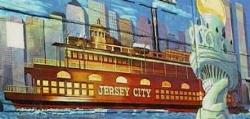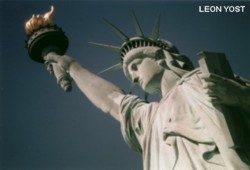 |  |  |
|
| ||
 |  |  |
 |  |  |
|
| ||
 |  |  |
|
|
By Harriet Phillips Eaton
Published 1899
This Web version, edited by GET NJ
COPYRIGHT 2002
At the first call for troops some of the business men of Jersey City advanced the money necessary for their outfits. A camp was formed for the Jersey troops west of the reservoir and was occupied from the beginning to the close of the war. The Second was the only regiment recruited entirely from Jersey City, but different companies joined various Jersey regiments and many men enlisted in New York regiments, but wherever they went they sustained the reputation won in Revolutionary days of the "True Blues of Jersey."
Many of her brave men, officers and privates, were left upon southern battlefields. After the battle of Antietam eleven families in one block in Fifth street mourned for their dead heroes. Colonel Zabriskie and Colonel Van Houten both fell in battle. Their memories are still cherished and their brave deeds commemorated in the Grand Army Posts which bear their names. Others were more fortunate and lived to wear the honors won by them.
Chief of Police Benjamin Murphy enlisted before he was seventeen, in the 8th N. J. Infantry, which belonged to the famous Second New Jersey Brigade. He was one of less than twenty men of his regiment who served with it continuously from its organization until it was mustered out without having been absent during its service of four years and eleven months. He was promoted from private through the various grades of non-commissioned officers up to captain. After the war he was connected with the post office for a time, and raised Company "C" of the 4th Regiment about 1893. After he joined the police force he resigned from the National Guard. The good order and discipline of the police force is due to his executive ability. He was the author of and secured the passage of "The Tenure of Office" law, which has improved the police force throughout the state. Colonel Robinson of the police force is a war veteran also, but served with a Maryland regiment and came to Jersey City after the war.
Brevet Major General John Ramsey had "few superiors as a stubborn fighter." Several times he received honorable mention in official reports and won his promotions step by step, from 1st Lieutenant up, for "distinguished gallantry. Colonel John J.Toffey entered the Second Regiment a boy of eighteen, re-enlisted in the 33rd Regiment as Lieutenant, and at Chattanooga was called upon to lead a forlorn hope in the place of two captains who had fallen in the attempt; his "superlatively brave conduct saved the position and enabled the entire line the following morning to press forward and unite the lines of the army of the Cumberland with those of General Sherman's army at the mouth of the Chickamauga." At the moment of success Colonel Toffey received a wound which incapacitated him from future service on the field, but he has continued his military services in the Veteran Corps and in the State Militia. He is the proud possessor of a Medal of Honor, granted by Congress under the Act of 1863, "for distinguished bravery in the battle of Chattanooga, November 23, 1863."
Although Jersey City has been so well represented in the volunteer army, there are but three Jersey City men in the regular army; Captain J. B. Vreeland, now retired, but serving as Quartermaster in the war with Spain, and George B. Arrowsmith and John J. Toffey, Jr., who have been appointed Second Lieutenants during the present summer. The late Major Gaines was in the regular army and served during the Mexican War. He organized a regiment during the Civil War. For a great many years he was connected with the Surveyors' Department of the New York Custom House, and was the delegate appointed by the United States at the Paris International Conference to bring about a uniform system of measuring the tonnage of vessels. He was also prominent in procuring increased cubic space for steerage passengers.
|
|
|
|
 Your Ancestors' Story |
 Bruce Springsteen's Jersey Shore Rock Haven! |

|
UrbanTimes.com |